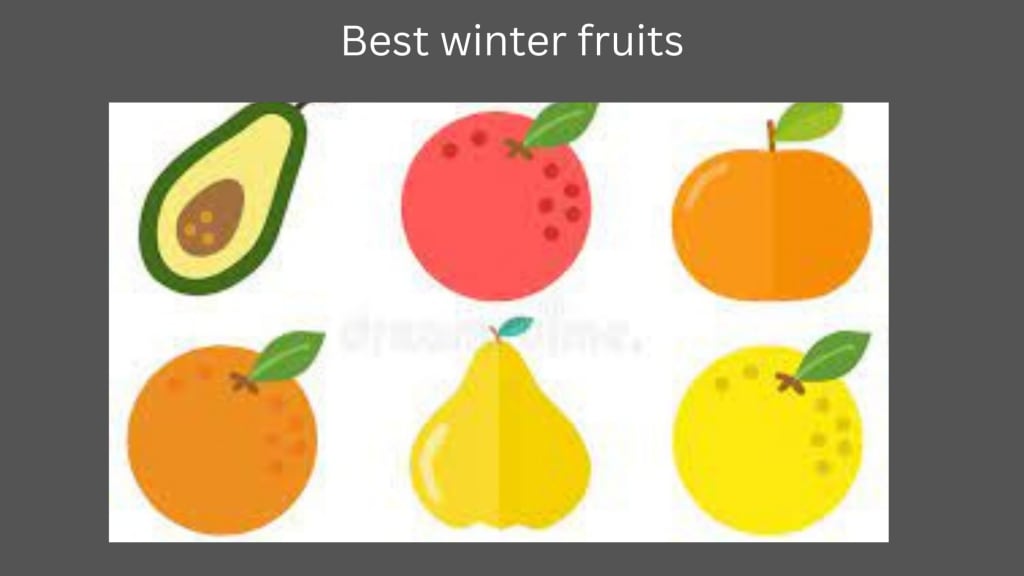10 Best winter fruits to eat
Generally, all fruits are low in calories and helps in weight management.

Fruit is a plant’s ovary that contains seeds. Fruits come in many shapes and sizes, and the flesh inside can be sweet or sour. No need to avoid fruits during winter. Here are some best winter fruits and their advantages. Some fruits are eaten raw, while others are cooked to make jams or jellies.
Fruits are a very important part of a healthy diet because they contain lots of vitamins, minerals, dietary fiber, and antioxidants that are good for our health.
Winter fruit is a great way to combat the winter blues. There are many health benefits of winter fruit and we’ll take a look at just a few.
The benefits of winter fruit are plentiful, but the most popular ones are vitamin C and antioxidants. Vitamin C is an essential nutrient that helps boost your immune system and fight off colds, while antioxidants help slow down aging by neutralizing free radicals in your body.
Best winter fruits
Bananas for Vitality
Banana is a favorite fruit for all aged people. It is one of the best fruit in all the seasons and is the best winter fruit to eat too. You can restrict bananas during winter only when you have sinus and respiratory-related ailments.
A banana is always called a multivitamin fruit. It has potassium, folate, iron, fiber, calcium, and many other essential vitamins and nutrients.
Apples for Energy
Apples are known for instant energy boosting due to their natural sugar. It also has pectin fibers, proteins, and carbohydrates. It helps in improving your metabolism and digestion.
Bad weather may affect your blood vessels leading to increased high blood pressure but when you intake apples, the presence of pectin fibers and polyphenols would reduce the risk of cardiac diseases.
Pears Promote Healthy Eating Habits
If you are suffering from respiratory-related ailments this winter, then pears are one of the best winter fruits to eat. Pears were used to clear the lungs for more than 1000 years. It is rich in fiber, low in calories, high in polyphenols, and makes you feel full for a longer time.
Oranges Promote Good Health
Vitamin C is very essential for your body in all seasons. During winter, your bone density may become low due to cold weather. Eating calcium-rich fruits is not only enough to strengthen your bones but also it is good to add citrus fruits to absorb the calcium in your body. Oranges and lemons are rich in vitamin c and are the best winter fruit to add to your regular diet.
Pineapple for anti-inflammation
Pineapple is known for its anti-inflammatory content. The antioxidant present in it helps fight diseases and improves digestion. It also helps in reducing bone-related problems like arthritis.
Cranberries for antioxidants
Benefits of including cranberries in your regular diet help in improving digestion, heart health, and brain health too. Recent research shows that cranberries played a major role in improved blood vessel function.
Pomegranates for vitamin K
Pomegranates, which typically ripen in the winter, are well-known for their bright color. Pomegranate seeds’ vivid blood-red color is a result of polyphenols, potent antioxidants. More antioxidants are present in pomegranate juice than in the rest of other fruit juices.
Additionally, it has three times as many antioxidants as green tea and red wine. Pomegranate juice’s antioxidants may help fight off free radicals, defend cells from damage, and decrease inflammation. It is rich in vitamins K, D, and vitamin C.
Kiwi for vitamin C
Kiwi is also known as Chinese gooseberry. It is a multivitamin fruit providing especially vitamins E and K on top of all fruits. According to Harvard’s School of Public Health, one kiwi supplies around 80% of an adult’s daily vitamin C needs. In addition, fiber, potassium, and vitamin K are all abundant in them.
Persimmon for Vitamin A
This tiny fruit, which resembles a tomato, is meant to help keep your heart healthy, digestion working smoothly, and eyesight strong.
Important vitamins and minerals such as vitamins A, C, and B, potassium, and manganese are abundant in persimmons. Additionally, they include valuable plant ingredients such as flavonoids and tannins. The B vitamins thiamin (B1), riboflavin (B2), folate, magnesium, and phosphorus are also abundant in persimmons.
The bright fruits are also high in fiber and low in calories. One persimmon has more than half the daily requirement of vitamin A.
Grapefruit for cancer-fighting abilities
Grapefruit is another good source of vitamin C. As a result, they might contribute to the protection of cells against possible damage from unstable chemicals known as free radicals. It helps in reducing the risk of cancer, particularly prostate cancer according to recent research.
Warning Signs of Diabetic Heart Attacks
How to Store and to Prevent Bacterial Contamination
This section will discuss the different ways to store and select your products to prevent bacterial contamination and keep it fresh longer.
There are many steps you can take to prevent your produce from spoiling too quickly. One of the most important things is to make sure that your fruit is clean before you buy it. This includes washing it with water, scrubbing off any dirt, and then rinsing it with cold water again.
The next step is to make sure that you appropriately store your products. Fruits should not be stored next to raw meats or fish, as this may contaminate them with bacteria that could cause food poisoning. It should also be stored at a low temperature so that any bacteria on the surface of the fruit or vegetable can’t grow and cause spoilage.
Finally, when selecting fruits at the grocery store, make sure you choose a variety of fruits and vegetables which are in season to get better quality food for less money!
Conclusion
There are a lot of winter fruits that you can enjoy this season. Some of them are not as popular as others, so they might be new to you. This is why we created this list of the top 10 winter fruits. Generally, all fruits are low in calories and helps in weight management.
We hope that you find it useful and enjoy the fruit!





Comments
There are no comments for this story
Be the first to respond and start the conversation.